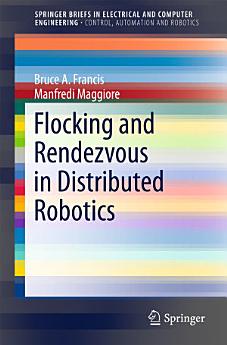Flocking and Rendezvous in Distributed Robotics
ກ່ຽວກັບປຶ້ມ e-book ນີ້
One can get intuition for the problem from the natural world, for example, flocking birds.
How do they achieve and maintain their flying formation?
Recognizing their importance as the most basic coordination tasks for mobile robot networks, the brief details flocking and rendezvous. They are shown to be physical illustrations of emergent behaviors with global consensus arising from local interactions. The authors extend the consideration of these fundamental ideas to describe their operation in flying robots and prompt readers to pursue further research in the field.
Flocking and Rendezvous in Distributed Robotics will provide graduate students a firm grounding in the subject, while also offering an authoritative reference work for more experienced workers seeking a brief but thorough treatment of an area that has rapidly gained in interest.
ກ່ຽວກັບຜູ້ຂຽນ
Manfredi Maggiore was born in Genoa, Italy. He received the “Laurea" degree in Electrical Engineering in 1996 from the University of Genoa and the PhD degree in Electrical Engineering from the Ohio State University, USA, in 2000. Since 2000 he has been with the Edward S. Rogers Sr. Department of Electrical and Computer Engineering, University of Toronto, Canada, where he is currently Professor. He has been a Visiting Professor at the University of Roma Tor Vergata (2001) and the University of Bologna (2007-2008). His research focuses on mathematical nonlinear control, and relies on methods from dynamical systems theory and differential geometry.
Bruce Francis was born in Toronto, Canada. He received all three degrees (BASc, MEng, PhD) from the University of Toronto. He has held teaching and research positions at Berkeley, Cambridge (UK), McGill, Concordia, Yale, and Waterloo, and finally the University of Toronto from 1984 to 2011. He retired in 2011 and since then has been an Emeritus Professor at the University of Toronto. He is the author and co-author of seven books (counting An Introduction to Distributed Robotics). In 2015 he received the IEEE Control Systems Award.






